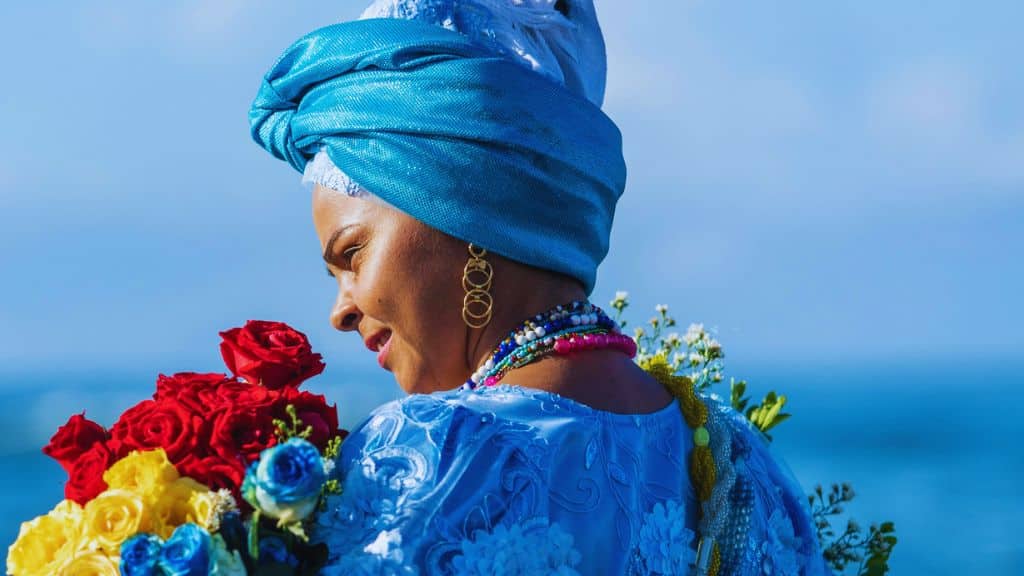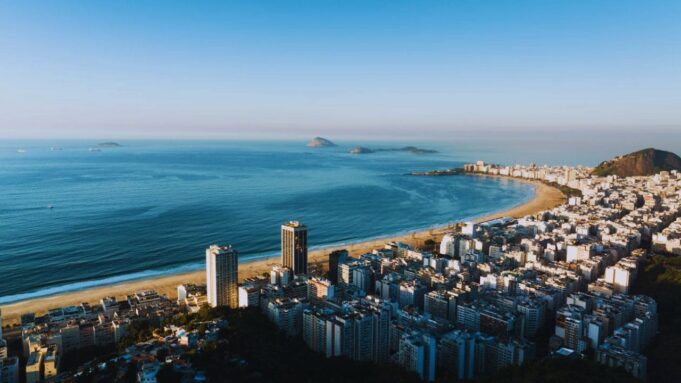Walk through Rio de Janeiro at sunset and you’ll hear it before you see it: the echo of drums bouncing off colonial walls, a chorus rising from an alley bar, a surdo heartbeat in sync with the city’s pulse. Music isn’t just heard in Rio – it’s lived, and much of that rhythm traces its roots to Afro-Brazilian traditions that have shaped not only its soundtrack but its identity.
Afro-Brazilian music is alive and kicking everywhere you go. From the wild energy of Carnival to quiet, sacred ceremonies, from samba circles to lively street festivals – it’s always changing, always growing.
This music tells a story of where people come from, what they’ve been through, and how they keep moving forward. It’s the heartbeat of the Marvelous City, and you feel it in every corner.
A 60-Year Return: Carnival’s Cultural and Economic Power
This year, a significant moment in Rio’s musical landscape unfolded when Unidos de Padre Miguel, a samba school from the working-class neighborhood of Vila Vintém, returned to Rio’s elite Carnival league after nearly six decades.
Their return wasn’t just about taking the win on the Sambadrome stage. It sparked new energy in the whole community. The build-up brought work to hundreds of local folks – welders, costume makers, musicians, dancers, all coming together. It’s a reminder that samba isn’t just a show; it’s the lifeblood of the neighborhood.
The Sound of Resistance: Afro-Brazilian Spirituality in Carnival

In 2025, at least nine of Rio’s twelve top samba schools infused their Carnival themes with Afro-Brazilian religious stories, especially those linked to Candomblé, Umbanda, and the orixás (deities of nature and spirit) (Brasil de Fato).
Far from being symbolic, these themes reclaim cultural space. For years, Afro-Brazilian religions were sidelined or demonized. Now, through music and costume, they’re being celebrated, often to crowds of millions. This isn’t just cultural, it’s political and spiritual visibility. Samba isn’t neutral. It carries memory and resistance in every beat.
Where to Feel the Pulse: Music Beyond the Sambadrome
Experience the true heartbeat of Brazilian music beyond the iconic Sambadrome. From lively street parties to hidden local bars, discover where the real rhythm of Brazil comes alive.
Pedra do Sal
In the heart of Rio’s historic Little Africa district, Pedra do Sal’s weekly Roda de samba draws everyone from elders to tourists. It’s a real, local vibe – deeply Afro-Brazilian under the open sky, where the music flows easily, rooted in history but always mixing things up on the spot.
Feira da Glória
This Sunday market is way more than fruits and street food. As Reuters noted in March 2025, it’s one of the best places to catch live, spontaneous performances – from capoeira and pagode to fresh new mixes blending samba, funk, and jazz.
Lapa & Fundição Progresso
If you want a night that’s part history, part pure energy, Lapa’s the place to be. Under those famous arches, venues like Fundição Progresso come alive with Afro-Brazilian bands, live percussion jams, and dance parties that keep going until dawn.
Afro-Brazilian Music Today: What to Listen For
Afro-Brazilian music in Rio is way more than just the classic samba you might expect. Here’s what you’ll hear out there:
Samba de Roda: This is the real, old-school heart — usually acoustic, intimate, with people gathered in a circle, sharing the music.
Samba Reggae: It started in Bahia but has found a strong home in Rio’s favelas, with layered drums and a cool Afro-Caribbean groove that gets everyone moving.
Funk Carioca with Afrobeat: DJs and collectives like AfroFunk Rio are mixing Rio’s raw funk sounds with West African beats, creating something fresh and alive.
Neo-Samba Fusion: Young artists like Xênia França and Majur bring soul, R&B, and traditional drumming into radio-ready tracks.
Streaming these styles before your visit helps you tune in, not just musically, but culturally.
Travel Smart: Where Rhythm Meets Respect
While Rio is a lively and welcoming city, music scenes vary. Some are set in touristy zones like Ipanema or Lapa, while others are rooted in communities that deserve respect and awareness. If you’re planning to explore samba from its roots:
Go with a local guide or host when visiting lesser-known favelas or rodas.
If you’re visiting Brazil, a few things to keep in mind:
Always ask before you start filming or taking photos, especially during religious ceremonies or drum circles. Respect goes a long way.
If you catch a live show, tip the musicians generously. Many depend on these community gigs to make a living.
And try to learn a few basic Portuguese greetings, it helps break the ice. After all, music is a conversation, and a little effort goes a long way.
Before you go, it’s a good idea to check your travel visa requirements, plan how you’ll get around the region, and get your documents ready, especially if you’re heading to big festivals or cultural events. Brazilevisas helps you do just that without any hassles.
Don’t Miss These in 2025
Rio offers countless chances to immerse yourself in Afro-Brazilian music. Here are a few top picks this year:
Carnival Street Blocos: Afro-centric blocks like Ilê Aiyê and Afroreggae lead thousands through the streets with messages of ancestry and inclusion.
Festival da Música Negra (July): Celebrates Afro-diaspora sounds – Afrobeat, samba, funk, and beyond – at venues across Rio’s North Zone.
Casa do Jongo: A museum and cultural space devoted to Jongo, a musical ancestor of samba, offering workshops and weekend jam sessions.
Final Note: Rhythm as Identity
To truly know Rio, you have to feel its rhythm. And to feel that rhythm, you have to understand where it comes from – centuries of Afro-Brazilian culture, struggle, and celebration. Whether you’re dancing in Lapa, swaying at a roda, or sitting quietly at a Candomblé ceremony, you’re witnessing more than music. You’re feeling Rio’s soul speak.
To Know More: South Africa Tours.















